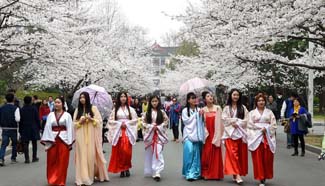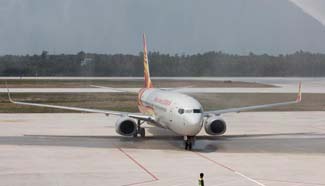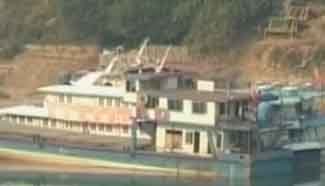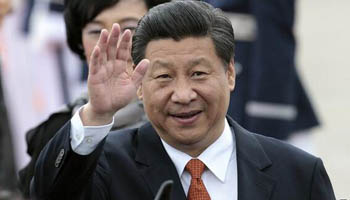????Military reform never aims to win praise, but to win wars. Such reforms could inevitably lead to competition and collision between the old and the new.
????So why do we choose such turbulence?
????Because victory can only be achieved through change.
????Revolution or destruction
????The Prussian army was crushed in the Battle of Jena in October 1806. Carl von Clausewitz blamed the defeat on a lack of imagination caused by routine. As aide-de-camp to Prince August, Clausewitz was shamefully captured during the battle. The renowned Western military strategist concluded three reasons for his failure: mid and high ranking officers seldom identified fundamental changes to warfare; officers cared more about their rank and social status than training and combat; soldiers lacked patriotism and spirit.
????Clausewitz said anyone who was not biased against Prussia before 1806 would say it had degenerated to nothing more than its appearance. People could still hear a machine creaking, but no one asked if it was still working.
????Thirty-six years later, a similar tragedy befell China.
????The army of the Qing Dynasty was defeated in the First Opium War in August 1842. Historian Tsiang Tingfu said: “The fatal wound to the Chinese nation was not the defeat, but the failure to realize the importance of reform. If we had started reforming earlier, our modernization would have been 20 years ahead of Japan, and the modern history of the Far East would have taken another shape.”
????Why 20 years late for the reform? Tsiang identified three reasons: the Chinese were too attached to past practices and had difficulty admitting the necessity of reform; new policies would shake the status of officialdom in feudal China and face immediate opposition; China’s intellectual class and bureaucracy lacked an independent and forthright spirit.
????As a result, a series of unequal treaties shocked the country. A Macao newspaper said: “China had outdated weapons and few strategies, and its 700,000 soldiers could hardly fight.”
????From the Battle of Jena to the Opium War, military reform was difficult for many countries.
????But without reform or innovation, a country will inevitably be destroyed.
????Communist Party reinvents China’s army
????As imperial ministers of the Qing Dynasty withdrew from the stage, new leaders with historical self-consciousness came to the fore. The people’s army founded by Mao Zedong-led Communist Party of China brought not only radical changes to China’s military, but to the wider world as well.
????China’s revolution was characterized by the ideas that “political power grows out of the barrel of a gun,” as well as “using the rural areas to encircle the cities” and “taking the cities last.” The most distinctive phenomenon was that it accessed the most advanced ideas in the most developed cities and recruited the bravest warriors in the most backward villages. Mao pulled the armies into rural areas of the Jinggang Mountains after the Autumn Harvest Uprising. When someone accused him of being a “mountain king,” he said the “mountain king” led by the Party had its own policies and ideals, and was thus a very special “king.” Mao said mountain kings were never wiped out in feudal China, and only taking rural areas where the rule was weakest could lead to success.
????Mao used his wisdom to identify the enemy’s weak points. But popularizing advanced ideas in backward areas, where traditional mindsets prevailed, was never easy. There was a huge gap between the advancement of revolutionary goals and the backwardness of rural residents.
????China’s history has no lack of deprived farmers who rose in revolt and proclaimed themselves “kings.” The results were always another round of feudal tragedy. Breaking the disastrous cycle became a serious test of military innovation for the Party.
????Faced with the majority of its new soldiers having backward ideas, the Party did not compromise, realizing the arduous transformation of the majority by the advanced minority and the reinvention of the Party during the Gutian Meeting in 1929. An army mainly comprising farmers raised in traditional environments had been transformed into an advanced revolutionary force.
????Echoing Mao’s achievement, at a military political work conference in a former revolutionary base in Gutian Township in east China’s Fujian Province, President Xi Jinping called for strengthened ideological and political work to build stronger armed forces.
????Together with innovation in army building, innovation in operating methods was also underway. A whole set of new tactics and strategies had utterly separated the Red Army from outdated military traditions as well as other armies. Ross Terrill wrote in Mao’s biography that Mao’s real creation was the combination of three things: gun, armed peasants and Marxism. It is the great innovation of the Communist Party of China and the great contribution of Chinese nation to world military history.
????Lagging behind leaves one vulnerable
????Resting on past glories, China’s military faces unprecedented challenges.
????Space, communication and computer technologies have advanced by leaps and bounds since the mid-20th century. Scientific and technological achievements in recent decades have surpassed all the breakthroughs of the past 2,000 years. Modes of production and lifestyles have undergone significant changes, which will inevitably influence military affairs and warfare. Many things in the world can be replicated, but not victory. Those who don’t understand new modes, tools or technologies are vulnerable to attack.
????The external prompts of military reform in China are the radical changes in weaponry, methods of fighting, types of war, military thinking and global organization and command. As for internal causes, the structure of national security has changed due to the structural change of the national economy. Today’s China must be able to maintain ever-expanding national interests in areas such as sea, space, frequency spectrum, the Internet and geopolitics.
????The restrictions are many. The first is a weak information-gathering ability. Second is a poor strategic-projection capability, which has long been a hurdle for China to deal with both conventional and non-conventional security threats. Third is a lack of strategic deterrence, which can only be achieved through action and determination. Fourth is a weak capability in organization and direction. Russia pointed out in a war report on Chechnya (1994-1996) that the likelihood of victory became extremely low if the commander made a mistake, and the only hope was pinned on soldiers who fought dauntlessly. Military officers determine the quality of troops in modern warfare. In this sense, effective military reform depends on building a system that produces the most excellent military talents and rejects those who care about rank and money, but are afraid to fight in battle.
????Practice, innovation key to reform
????China is embracing a golden era of national defense and military construction. Building a strong army commensurate with China’s international status as well as its national security and interests is a realistic quest. It involves a shifting of power -- letting leading actors of the past take supporting roles and vice versa. It also requires changes in fighting patterns, which will have a tremendous impact on existing military structures and concepts. But it is a historic mission that this generation of Chinese soldiers must complete. There is no escaping it, no matter how difficult.
????The first difficult part is practice. As Karl Marx said, whether the human mind is objective and truthful is not a theoretical question, but a practical one. Once set to practice, people will soon find a lot difference between theoretical deduction and practical operation. In reality, one needs to take care of interests, balance, advance or retreat at certain points, and stability. Difficulty stemming from practice can always deal a heavy blow to seemingly perfect theories -- so many things must be done. But the last and the most powerful “must” should be the guarantee of the success of reforms: an army must win in war. Any “must” that hampers winning must be abandoned.
????The second difficulty in the way of reform is innovation. A saying has it that drawing a tiger with a cat as a model is easy. But imitation has never been the style of the Chinese People's Liberation Army. Those who only follow the steps of others will always fall behind. The Americans first put forward the idea of non-war military operations, but ceased to use it and replaced with full-spectrum military operations in 2006. Then they introduced an air-sea battle concept, which was later replaced with other concepts. No matter how those ideas change, one thing that does not change is that they don’t have the permanent truth that we expect. No matter how hard we try to imitate them, all we have is American pragmatism that will not suit the situation in China.
????Our reform is not to follow others, but to realize our own operational independence based on our own advantages.
????Innovation is our tradition and the lifeline of the army.










